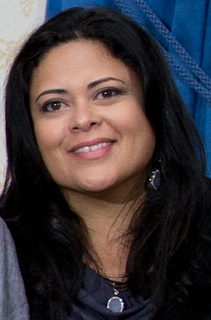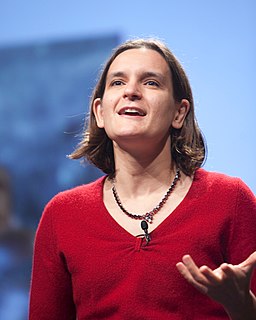Related Research Articles
Nation-building is constructing or structuring a national identity using the power of the state. Nation-building aims at the unification of the people within the state so that it remains politically stable and viable in the long run. According to Harris Mylonas, "Legitimate authority in modern national states is connected to popular rule, to majorities. Nation-building is the process through which these majorities are constructed."

Maya Kasandra Soetoro-Ng is an Indonesian-American academic, who is a faculty specialist at the Spark M. Matsunaga Institute for Peace and Conflict Resolution, based in the College of Social Sciences at the University of Hawaiʻi at Mānoa. She is also a consultant for the Obama Foundation, working to develop the Asia-Pacific Leaders Program. Formerly a high school history teacher, Soetoro-Ng is maternal half-sister to Barack Obama, the 44th president of the United States.

Mark Juergensmeyer is an American sociologist and scholar specialized in global studies and religious studies, and a writer on comparative religion, religious violence, and global religion. He is Distinguished Professor Emeritus of Sociology and Global Studies at the University of California, Santa Barbara, and William F. Podlich Distinguished Fellow and Professor of Religious Studies at Claremont McKenna College.

Esther Duflo, FBA is a French–American economist who is a professor of Poverty Alleviation and Development Economics at the Massachusetts Institute of Technology (MIT). She is the co-founder and co-director of the Abdul Latif Jameel Poverty Action Lab (J-PAL), which was established in 2003. She shared the 2019 Nobel Memorial Prize in Economic Sciences with Abhijit Banerjee and Michael Kremer, "for their experimental approach to alleviating global poverty".

Innovations for Poverty Action (IPA) is an American non-profit research and policy organization founded in 2002 by economist Dean Karlan. Since its foundation, IPA has worked with over 400 leading academics to conduct over 600 evaluations in 51 countries. The organization also manages the Progress out of Poverty Index.

The Abdul Latif Jameel Poverty Action Lab (J-PAL) is a global research center working to reduce poverty by ensuring that policy is informed by scientific evidence. J-PAL conducts randomized impact evaluations to answer critical questions in the fight against poverty, and builds partnerships with governments, NGOs, donors, and others to generate new research, share knowledge, and scale up effective programs.
Salma Malik is teaching at the Department of Defence and Strategic Studies, Quaid-e-Azam University, Islamabad.

The Faculty of Medicine is the academic centre for medical and clinical research and teaching at Imperial College London. It contains the Imperial College School of Medicine, which is the college's undergraduate medical school.

Rachel Glennerster is the chief economist at the Department for International Development (DFID), the UK's ministry for international development cooperation, after formerly serving on DFID's Independent Advisory Committee on Development Impact. She is on leave as an affiliated researcher of the Abdul Latif Jameel Poverty Action Lab (J-PAL). She was the executive director of J-PAL until 2017 and the lead academic for Sierra Leone at the International Growth Centre, a research centre based jointly at The London School of Economics and Political Science and the University of Oxford. She helped establish the Deworm the World Initiative, a program that targets increased access to education and improved health from the elimination of intestinal worms for at-risk children and has helped "deworm" millions of children worldwide.

Poor Economics: A Radical Rethinking of the Way to Fight Global Poverty (2011) is a non-fiction book by Abhijit V. Banerjee and Esther Duflo, both professors of Economics at Massachusetts Institute of Technology (MIT) and Nobel Memorial Prize in Economic Sciences laureates. The book reports on the effectiveness of solutions to global poverty using an evidence-based randomized control trial approach. It won the 2011 Financial Times and Goldman Sachs Business Book of the Year Award.
Amy Nadya Finkelstein is a professor of economics at the Massachusetts Institute of Technology (MIT), the co-director and research associate of the Public Economics Program at the National Bureau of Economic Research, and the co-Scientific Director of J-PAL North America. She was awarded the 2012 John Bates Clark Medal for her contributions to economics. She was elected to the National Academy of Sciences and won a MacArthur "Genius" fellowship in 2018.
Erica Chenoweth is an American political scientist, professor of public policy at the Harvard Kennedy School and the Radcliffe Institute for Advanced Study. They are known for their research work on non-violent civil resistance movements.
The Arnold A. Saltzman Institute of War and Peace Studies (SIWPS) is a research center that is part of Columbia University's School of International and Public Affairs in New York. It was founded in 1951 by President of Columbia Dwight D. Eisenhower as the Institute of War and Peace Studies (IWPS) and was led for its first 25 years by Professor William T. R. Fox. It was given its current name in 2003. By its own description, the institute's researchers analyze "the political, military, historical, legal, economic, moral, psychological, and philosophical dimensions of international relations."

Sara Youcha Goldrick-Rab is an American professor, sociologist, and author. Goldrick-Rab is currently the Professor of Sociology and Medicine at Temple University., the Founding Director of The Hope Center for College, Community, and Justice, the founder and Board Secretary of Believe in Students, and the Chief Strategy Officer for Emergency Aid of Edquity. A sociologist of higher education, Goldrick-Rab's research focuses on policies that aim to reduce socioeconomic and racial inequalities. She received the American Educational Research Association (AERA) Early Career Award in 2014, the 2018 Grawemeyer Award for Education, and a Carnegie Fellowship in 2018.

Séverine Autesserre is a French-American author and researcher. She writes about war and peace, peacebuilding, peacekeeping, humanitarian aid, the ongoing conflict in the Democratic Republic of Congo, and African politics. Her research has influenced policy interventions as well as scholarly debates on peacebuilding and on Congo. Autesserre is a Professor and Chair of Political Science at Barnard College, Columbia University, where she specializes in international relations and African studies. Before becoming an academic, she worked for international humanitarian and development agencies.
Pascaline Dupas is a French economist whose research focuses on development economics and applied microeconomics, with a particular interest in health, education, and savings. She is a professor in economics at Stanford University, holds senior fellowships at the Stanford Institute for Economic Policy Research and the Freeman Spogli Institute for International Studies and is a co-chair of the Poverty Action Lab's health sector. She received the Best Young French Economist Prize in 2015.

Hassan Mohammed Abdul Latif Jameel is a Saudi businessman and philanthropist. He is Deputy President and Vice Chairman of Saudi Arabia operations of the family-owned international conglomerate business Abdul Latif Jameel, which, among numerous business operations, has distribution rights to Toyota vehicles in Saudi Arabia and other countries. His philanthropy work promotes health and safety, and assists job-seekers and those in need in Saudi Arabia.

Roya Rahmani is an Afghan diplomat who has served as Afghanistan's first female ambassador to the United States and non-resident ambassador to Mexico, Argentina, Colombia, and the Dominican Republic from December 2018 to July 2021. From 2016 to 2018, she served as Afghanistan's first female ambassador to Indonesia, first ever ambassador to the Association of Southeast Asian Nations, and non-resident ambassador to Singapore.

Maria J. Stephan is an American political scientist. She is the former Director of the program on nonviolent action at the United States Institute of Peace. She studies authoritarianism, protest, and the effectiveness of violent and nonviolent types of civil resistance.
The Abdul Latif Jameel Institute for Disease and Emergency Analytics is a research institute at Imperial College London in the fields of epidemiology, mathematical modelling of infectious diseases and emergencies, environmental health, and health economics. Co-founded in 2019 by Imperial College London and Community Jameel, the Jameel Institute is housed in the School of Public Health, within the college's Faculty of Medicine. The mission of the Jameel Institute is "to combat threats from disease worldwide".
References
- 1 2 3 4 5 "Dana Burde Profile". New York University. Retrieved 14 April 2020.
- ↑ Clemans, Paul (January 2016). "Clemans on Burde, 'Schools for Conflict or for Peace in Afghanistan'". H-Net . Retrieved 14 April 2020.
- ↑ Hedayet, Mujtaba (November 2015). "Review of Schools for Conflict or for Peace in Afghanistan". Comparative Education Review. 59 (4): 788789. doi:10.1086/684048.
- ↑ Mieke Lopes Cardozo; Felix Fritsch; Taru Niskanen (2 October 2015). "Review of Schools for Conflict or for Peace in Afghanistan". South Asia: Journal of South Asian Studies. 38 (4): 852–853. doi:10.1080/00856401.2015.1082217.
- ↑ Paulson, Julia (2 April 2016). "Review of Schools for Conflict or for Peace in Afghanistan; From classrooms to conflict in Rwanda". Comparative Education. 52 (2): 273–274. doi:10.1080/03050068.2016.1166867. S2CID 147895884.
- ↑ Bahry, Stephen A. (1 December 2015). "Review of Schools for Conflict or for Peace in Afghanistan". Comparative and International Education. 44 (2): 1–2. doi: 10.5206/cie-eci.v44i2.9279 .
- 1 2 3 Butterweck, Kim (4 May 2017). "2017 Recipients". University of Louisville. Retrieved 14 April 2020.
- ↑ Tharoor, Ishaan (8 December 2014). "The Taliban indoctrinates kids with jihadist textbooks paid for by the U.S." The Washington Post. Retrieved 14 April 2020.
- ↑ Shane, Scott (25 August 2016). "Saudis and Extremism: 'Both the arsonists and the firefighters'". The New York Times. Retrieved 14 April 2020.
- ↑ Crilly, Rob (7 December 2014). "'Infidels are our enemy': Afghan fighters cherish old American schoolbooks". Al Jazeera. Retrieved 14 April 2020.
- ↑ "Tipping over Three Cups of Tea". The National Interest. Retrieved 14 April 2020.
- ↑ Kamenetz, Anya (6 December 2014). "Q&A: J Is For Jihad". NPR. Retrieved 14 April 2020.
- ↑ "If you build it, they will come. Especially girls". The World Bank. 15 May 2012. Retrieved 14 April 2020.
- ↑ "The Effect of Village-Based Schools in Afghanistan". Abdul Latif Jameel Poverty Action Lab. Retrieved 14 April 2020.